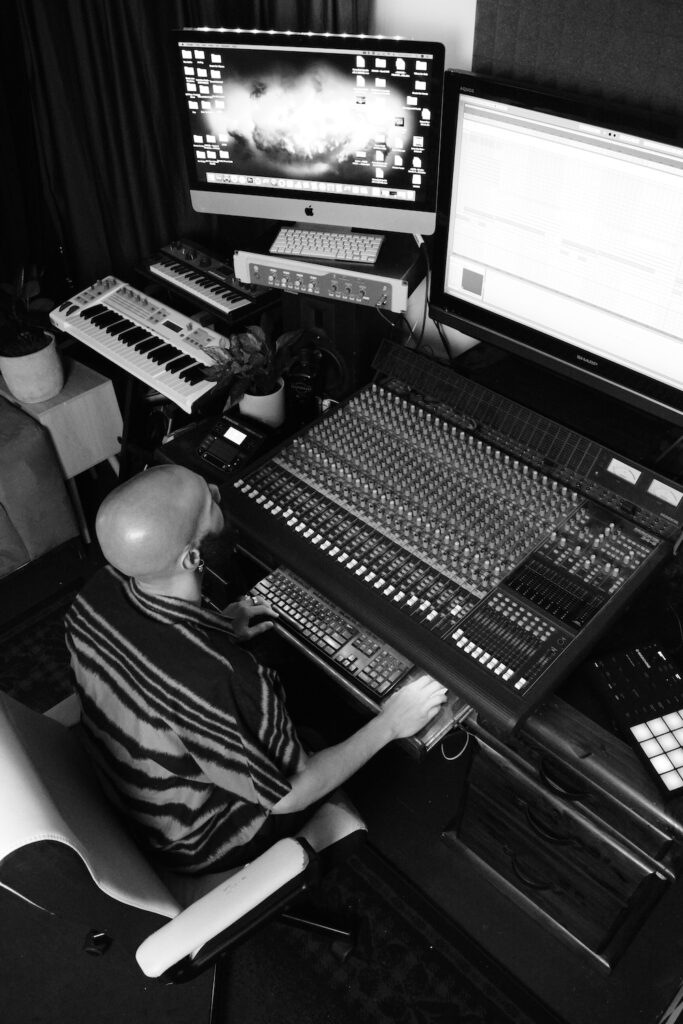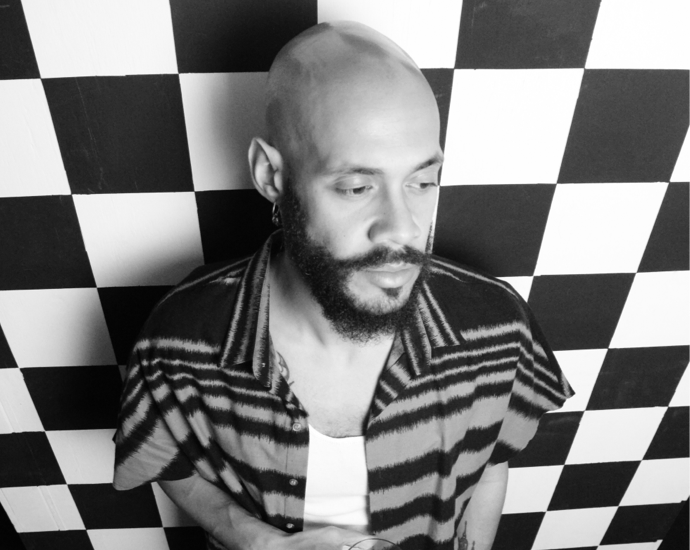Digging into the creative process, Byta speaks with artists, musicians, producers, DJs and anyone involved with music creation. A conversation about how they create, collaborate and share music. From studio setups to routines, and the first person to hear about the next 'big' work.
Where are you based?
Footscray in Australia. It’s about 10 minutes from Melbourne City.
How, when and where did you start making music? Are you primarily a musician or a producer, or do something else?
My first introduction to music creation was when I was really young and I would spend time with my Uncle. He had a bunch of different instruments and audio effects units. I would play around with them and he would teach me basic drum patterns. Then in High School, me and my mates would freestyle a lot at parties and in English class, eventually deciding to record a full song in my bedroom on Audacity. Seeing as though I was the only one with any experience with audio equipment, I became the engineer and producer by default, but still made time to get some raps down and pen the chorus. I ripped a beat from a ‘Sneaky Sound System’ CD and reversed the headphones so they could be used as a microphone and we got busy. The song was called ‘Ladies’ and got a little buzz around my High School. This was before the time of mass social connection through the internet, so there weren’t many avenues to continue to progress as a Hip Hop Artist in my hometown. I eventually moved to Melbourne, got my hands on Ableton and that’s when my artistry started to take form.
I consider myself a ‘Music Artist’, as the projects I work on are based on the overall vision and getting the right people involved to create that vision. I might be writing raps, writing lyrics, programming drums, playing bass, building chords, etc. Or I’m finding the right person to get the job done, depending on where the piece needs to go.
Who would you consider some of your biggest influences when it comes to your “sound”?
Bloc Party:
I am inspired by their use of emotive melodies and the way Kele has developed a unique vocal tone.
Kid Cudi:
The clash of genres and ability to build production that supports the vocal melodies and lyricism.
Kanye West:
His use of sampling and collaboration to get ideas out. Also his ability to go against the grain and continue to experiment.
Explain your creative process. Do you have a routine?
Music and lyrics happen simultaneously and collide chaotically during the creative process. I’ll constantly be writing, recording song ideas and collecting samples whenever they arise. Then when I sit down to create, things usually start with the music, which will evoke an emotion and then consciously or subconsciously I will draw on ideas or emotions in the moment. Being an independent artist, juggling all aspects of life makes it hard to spend long periods of time on the creative process. I usually find myself sporadically evolving a project and then getting brief moments where I’ll spend a solid few hours on them.
What is your “studio” setup?
I went to audio school to develop my understanding of acoustics. This led me to build a hybrid professional/home studio that I usually work out of. Studio equipment and gear is a means to an end for me, on the journey to creating my vision. I don’t obsess on it, but I want to understand it enough to express my art or translate it to collaborators. My favourite gear is my laptop and Ableton, I use it as a digital sketchpad to get my ideas down.

What is your process when working with other people? How is collaboration different in the studio vs working remotely?
When collaborating with others I’m always sitting back listening out for ideas and moments to capture. I think it comes from developing my songwriting skills by sampling old records. I would sit back and listen to a record and wait for moments to sample. I carried this into my collaboration process with others. I’m very attuned to the overall energy in a session and aim to cultivate this to guide a project in the right direction. It’s a tricky balance of letting go to allow the creativity to flow but also giving structure and guidance to keep things on track.
At what point(s) are you comfortable letting other people hear what you are working on?
I like to get a decent arrangement down before showing anyone. An exception to this would be if I’m collaborating with a fellow artist and we are building on an idea.
Do you share your work in progress (streams or downloads)? Any technical frustrations?
Yeah, all the time. Some issues I’ve had is with the interface on the phone for playing private tracks back. It can be difficult accessing the files easily and adding notes. I would love an app that simplifies the project management of working on music, I currently use Trello for this but would love something that incorporates the music creation process more.
How do you know when a track/album is finished?
It’s a balance of intuition and feedback from others that can provide different perspectives. To avoid the desire to be a perfectionist, I find it’s good to set a finish date and force yourself to do the best you can in a set time limit.
How do you listen to the final mixes/mastered work?
I like to reference my songs across as many systems as possible. I’ll start in the studio and then take it to the car, headphones, laptop speakers, etc. If someone else has engineered the track or made changes, they will email the file to me.
How important is pre-release security when sharing new work?
It’s good to know that Byta has good security to protect my tracks. No horror stories, hopefully it stays that way.
Who on your team gets to hear the final versions first and why, what formats do they each need?
I usually share the track with Audio Engineers in my creative circle to make sure the sonics are on point. The track will then get sent to my Executive Assistant for storage and file management, my Publisher to register copyrights, then the distributor to prepare for release and finally PR if we are building a campaign for the track.
Outside of your inner circle who are the people that will need to hear the new tracks next?
After a song has been sent to my team, I have a private group of fellow artists I share my music with and close family and friends.
Anything you are working on, anyone you are working with and want to share?
I just released a self-produced/Engineered song called ‘POISON’. It sits in the Alternative HipHop realm, layering heavy low end and rhythm with hazy indie guitar melodies. Next up is a song called ‘Room Full of Broken Hearts’. I’m in the midst of locking in an international feature for this song that I can’t speak on just yet.

